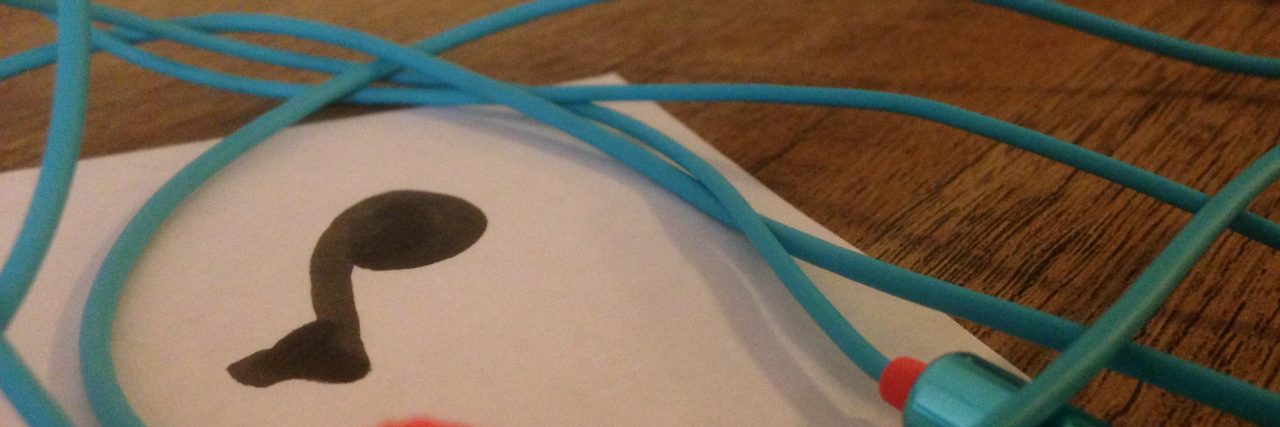My depression has “taken” many things from me, most of which I either expected it to take or which didn’t surprise me when they were gone. Friends, family, creativity, memory, emotion, cognitive processing, motivation, sleep, energy, hope, and more — it made a twisted kind of sense that depression would take these things away from me, especially after I did my research about its symptoms.
However, there was one thing I didn’t imagine depression might steal, one thing I didn’t even notice had been taken from my life until just a few weeks ago.
Music.
I see a lot of testimonies of people who say music really helps their depression, who say it is cathartic and helps them feel a little better, who say they would be lost without it. I suppose that’s why I never suspected the music would be taken from me, even while the taking happened.
Because, see, I used to love listening to music. I’ve had varying levels and lengths of depressive episodes most of my life, and music had always been a steady rock of comfort or catharsis. I once gravitated toward stripped-down songs with just an artist and a guitar so I could better hear the nuance of the voice, the accent of the instrument, the emotion behind the words. I liked soft voices and strings plucked by fingers rather than guitar picks. I liked songs that focused on the verses rather than the chorus because they felt more like stories. I liked lilting musical phrases that repeated over the course of a piece, crescendoing and de-crescendoing continually until the last gentle note.
But then, just over a year ago after I entered college, my depression and my anxiety swept the rug out from under me. I was in the worst place I had ever been in regards to my mental health, and it affected every area of my life and every interest I had. I just didn’t know it at the time.
Looking back, I can easily see the music slipping away from me. I can see myself as I turned from Ciaran Lavery and William Fitzsimmons to binaural beats and guided meditations as clearly I can see my fears and failures every night as I try to sleep. I can see myself as my depression twisted the beautiful songs I loved into daggers that made me cry for hours on end and punish myself with my nails and teeth.
My depression changed every hopeful song about the future into a dirge about the death of my dreams, every love ballad into a dreadful certainty that everyone I cared about didn’t want me, every happy phrase into a reminder of what I’d surely never feel again, and every minor key into a reassurance of how terrible and weak I would always be.
And the kicker is, I didn’t even notice until just recently. Quite by chance, I had scrolled to the bottom of my playlists — under the water sounds, the tapping ASMR, the meditations, and the endless sleep hypnosis tracks — and found playlists of songs (actual musical songs!) I hadn’t even looked at in months. Songs I used to listen to every day, for multiple hours, without fail. Songs I used to gain strength from, that used to make me happy. Songs I hadn’t realized I stopped listening to.
Last played: 7 months ago
Last played: 10 months ago
Last played: a year ago
My grief overwhelmed me. How had I lost such a large part of myself? How had I let myself lose this? What kind of person had I turned into for me to have not listened to music in months? When I tried listening to the music again, I had my answer.
I had turned into a person who couldn’t handle any reminders of how she used to be, of how far she had fallen.
Slowly, that’s changing. Now that I’m back in therapy, now that I’m getting the help and support I need, now that my depression has loosened its grip on me just a little bit, I can occasionally handle listening to the songs I used to love. Just a little.
Sometimes, it’s still too much, and I have to turn the music off before I begin the descent into that dark place (or I can’t, and I feel bad for letting the darkness take me again).
But other times, it reminds me I’m getting a tad bit better day by day, and the gentle swaying notes, rather than staining me with blood, begin to cleanse me instead.
If you or someone you know needs help, visit our suicide prevention resources page.
If you need support right now, call the National Suicide Prevention Lifeline at 1-800-273-8255, the Trevor Project at 1-866-488-7386 or text “START” to 741-741.
We want to hear your story. Become a Mighty contributor here.

